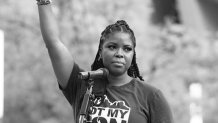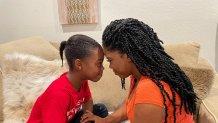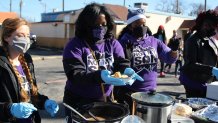In the past year, several local organizations have created an avenue for activism following George Floyd's death.
Some have evolved since then, turning from protests to full-fledged efforts to give back to the community.
Their efforts – originally born from something tragic – have turned into something beautiful, creating a path toward healing.
Not My Son
Get DFW local news, weather forecasts and entertainment stories to your inbox. Sign up for NBC DFW newsletters.
The organization Not My Son was essentially born out of the tear gas that flew almost a year ago at Margaret Hunt Hill Bridge, as protestors clashed with police days after Floyd’s death.
“It was the straw that broke America’s back,” said founder, Tramonica Brown.
His death was the catalyst that brought her and so many protestors to the streets of Dallas in the summer of 2020. She formed the organization in June when she witnessed protestors being shot with rubber bullets and tear gas during last summer’s protests.
“I didn’t want to see anybody’s babies get hurt with rubber bullets,” said Brown, who is both a mother and an educator. “It originally started with a group of teachers. No one protects more, I think, than moms and teachers.”

She said Not My Son helped create a safe space of meaningful conversation between activists and city leaders, law enforcement and lawmakers. Their first conversation rally brought together close to 1,000 people.
Local
The latest news from around North Texas.
“We challenged everybody to know who their city council member was. A lot of the fight that we want to change happens right here,” Brown said during our interview outside Dallas City Hall. “A lot of people march and don’t know what the cause is. So we wanted to make sure that people understood what you’re marching for.”
The name for the organization comes from the fear she said she feels for her own son and other Black children being racially profiled by police or discriminated against for the color of their skin.

“I don’t want it to be my son. I don’t want it to be anybody’s son,” she said. “The Black man is the one who is the most under attack. It’s unfortunate but it’s the reality.”
Her son was only two years old when the killing of Trayvon Martin by George Zimmerman gripped the nation in 2012.
“It just really broke me. I was a young mother, I was in college. It just hit me that there’s nothing I can really do. I can strive to live a better life and do better and achieve better, but at any moment my son can still be taken,” she said.
But what started with protests, evolved into something else. Over time, as volunteers and supporters showed up by the hundreds, their mission started to transform.
“Growth is beautiful,” Brown said.
She recalls the feeling last summer of wanting to do more. A lightbulb moment occurred during one of their marches.
“Instead of marching them through downtown, we marched through South Dallas. I think that was a breakthrough in the immediate growth of Not My Son. People were in tears. It’s amazing how many people have not been down Martin Luther King Boulevard but go to Fair Park. It showed a clear divide of what it looks like,” she said. “I said, ‘What do we do?’ And people said, ‘We just want to help.'"
So they started feeding the hungry and cleaning up neighborhoods. They created tutoring programs for kids and became a saving grace for 600 families during the winter storm in February.

Through the year, Brown said some volunteers have come and gone. But she was able to find true allyship through groups like Say Their Names, who brought an impactful exhibit to Dallas featuring the names of Black lives lost due to racism.
"To be an ally is not to be afraid to use your privilege for the better good. To me, allyship is doing your part when you know you can," she said. “It’s a marathon. So protesting is a way to garner the attention. Now that we have the attention, what are we going to do with it?”
This year, Brown said their next goal is to take communities back. She shared concern over some residents in South Dallas being forced from their homes to make way for more development.
“If it’s going to be a building of success, it needs to be around those people who live in that neighborhood, not just shove them out to put more in," she explained. "We’re not going to be able to take them back unless you’re teaching financial literacy for you to own something. Making sure that our grandmothers are paying their taxes and that they are not getting their land sanctioned because they have $40,000 in taxes that has to be paid in 30 days."
Despite the new efforts to give back to the community, Brown said activism through protest when injustices occur will still be a big part of her focus.
“Not My Son definitely turned into a community-based organization. Don't think for a second that we won’t protest, because we will," she said.
The Umbrella Project
Teresa Nguyen has been on her own journey of allyship.
Last June, she created an avenue for others to join her on that journey, called the Umbrella Project.
“My heart was heavy to do something,” she said.
She gathered up and distributed bright yellow umbrellas as a way to protect protestors from rubber bullets and tear gas during last year’s marches, an inspiration she drew from demonstrations in Hong Kong in 2014.
But it took on a different meaning once the group joined forces with Mothers Against Police Brutality, which requested the names of Black and Brown lives lost be painted on the umbrellas.
Then, what started with just a few dozen umbrellas, grew into 500. Each umbrella had a different name painted in bold, black paint by local artists and volunteers.
“It just kept growing,” Nguyen said. “It breaks my heart. It just became more real."
The movement expanded beyond Dallas, traveling to Juneteenth celebrations in Tulsa, OK., and more protests in Portland, Ore. The umbrellas were a staple in some protests to show the gravity of the fear and pain people were feeling during the movement.
“It became something a lot a lot more extraordinary,” said Nguyen.
Nguyen herself learned even more about the meaning of allyship, as anti-Asian hate crimes took a grip on America in the year since the pandemic began.
"“I try to take it one day at a time. Sometimes it’s one step at a time or one breath at a time -- trying to feel like you belong even though you were born and raised here,” she said. “You can’t just sit back. It’s so important to speak up and be a part of each other’s lives."
Looking forward into 2021, both groups are focusing on growth and the power of a collective as their fight for justice continues.
“I feel like last year was the setup,” Brown said. “And this year is just having those tough conversations and opening up the door and really factoring in -- what are you going to do?”
Get Involved
Both organizations have some big projects coming up in the next week.
Not My Son is organizing a clean-up and feeding of the homeless on May 29. They are in need of volunteers. See the flyer below or click here for more details.
The Umbrella Project is also bringing back the umbrellas in a touching art display starting June 4. For more information, follow their Instagram page.



